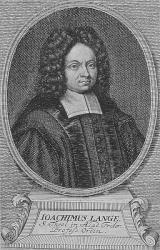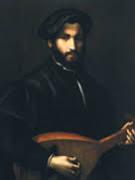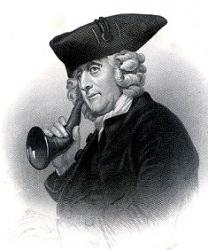
1670 - 1744 Person Name: J. Lange, 1670-1744 Topics: Morning Songs Author of "O Jesu, süßes Licht" in Evang.-Lutherisches Gesangbuch Lange, Joachim, D.D., son of Mauritius Lange, senior councillor at Gardelegen in the Altmark, was born at Gardelegen, Oct. 26, 1670. He entered the University of Leipzig in the autumn of 1689, where he shared rooms with A. H. Francke; and in 1690 followed Francke to Erfurt, and in 1692 to Halle. By the recommendation of J. O. Schade he was appointed, in 1693, tutor to the only son of F. R. L. von Canitz, at Berlin. Subsequently he became, in 1696, rector of the school at Coslin in Pomerania; in 1698 rector of the Friedrichswerder Gymnasium at Berlin, and in 1699 pastor of the Friedrichstadt church; and in 1709, professor of theology at Halle (D.D. 1717), where he d. May 7,1744 (Koch, iv. 343; Allg. Deutsche Biographie, xvii. 634, &c). In his day Lange was best known as a commentator on the whole Bible (Biblisches Licht und Recht, &c, 7 folio vols., Halle, 1730-1738); as a defender of Pietism against the “Orthodox” Lutheran controversialists of the early 18th century; and as the author of over 100 theological works. Only two hymns are known by him, one of which is:—
O Jesu, süsses Licht. Morning. First published in the Geistreiches Gesang-Buch, Halle, 1697, p. 4, in 8 stanzas of 8 lines. Repeated in Freylinghausen's Gesang-Buch, 1704, No. 608, and recently, as No. 469, in the Unverfälschter Leidersegen, 1851. Translated as:—
Jesu, Thy light again I view. A free translation, in 7 stanzas of 6 lines, by J. Wesley, in Hymns & Sacred Poems, 1739 (Poetical Works, 1868-72, vol. i. p. 159) ; repeated as No. 661 in pt. i. of the Moravian Hymn Book, 1754 (1886, No. 344, abridged). The form most used is that in the Wesleyan Hymn Book, 1780, No. 419, where st. i. is omitted; and it begins with st. ii., altered to "O God, what offering shall I give." This form is in Mercer, 1857 and 1864, Kennedy, 1863, and others; and in America, in the Methodist Episcopal Hymns, 1849, Evang. Association Hymn Book, 1882, &c. In the American Sabbath Hymn Book, 1858, a cento from Wesley's stanzas iii., vi., vii., is given as No. 917, beginning, "Now, O my God, Thou hast my soul."
Other translations are: (1) "O let me always think Thou'rt near," by J. Swertner, of st. vii., as No. 430 in the Moravian Hymn Book, 1789. In the 1801 and later editions. (1886, No. 567) it is altered, and begins, "O let us always think Thee near." (2) "O Jesu, welcome Light," by H. J. Buckoll, 1842, p. 47. (3) "O Jesu, Light most sweet." In the Family Treasury, 1879, P- 230. [Rev. James Mearns, M.A.]
--John Julian, Dictionary of Hymnology, Appendix, Part II (1907)
Joachim Lange




